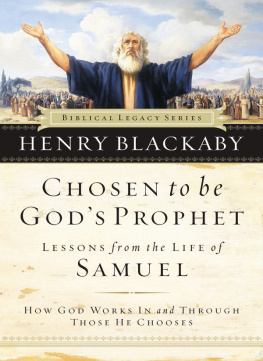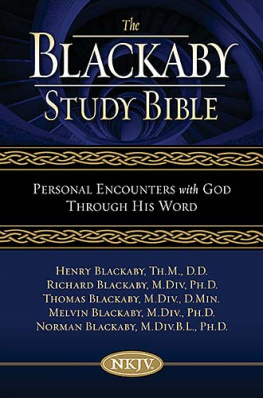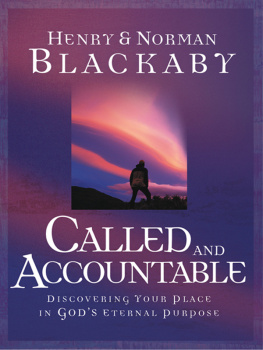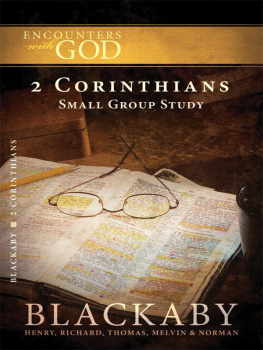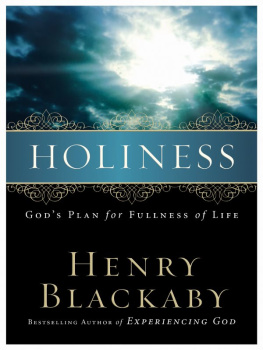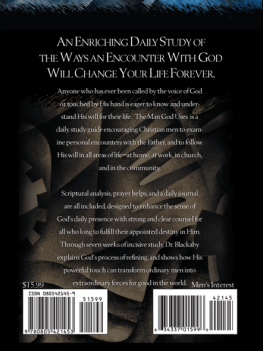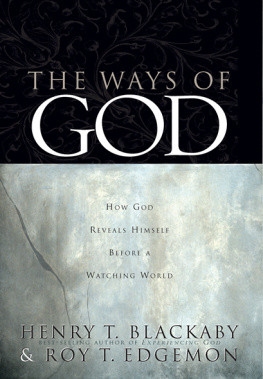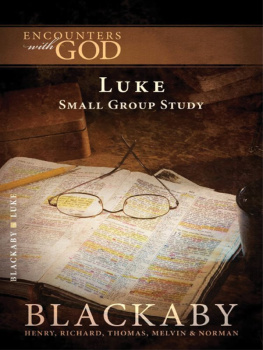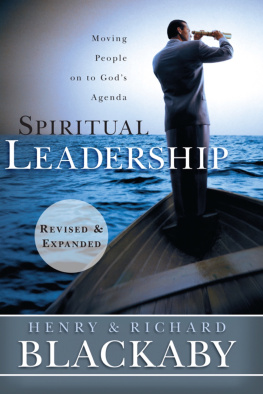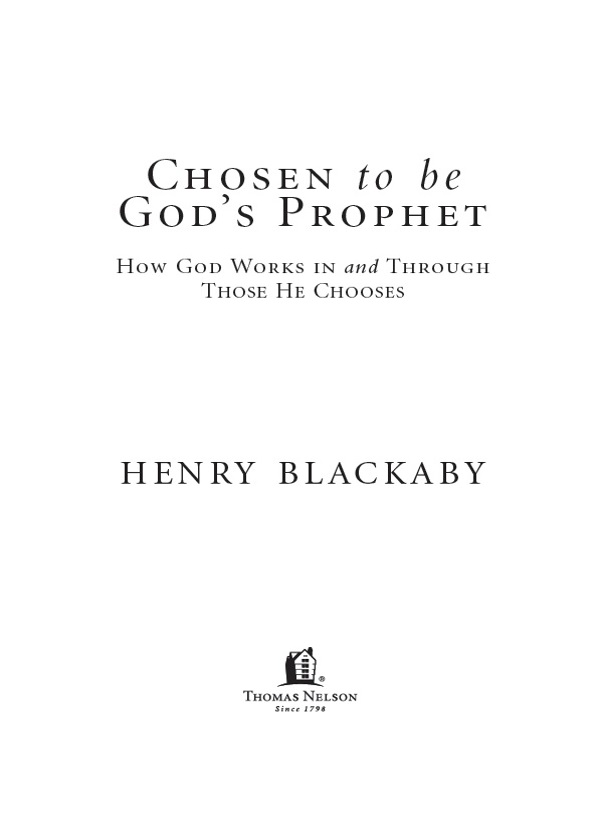C HOSEN to be
G ODS P ROPHET
2003 by Henry Blackaby
All rights reserved. No portion of this book may be reproduced, stored in a retrieval system, or transmitted in any form or by any meanselectronic, mechanical, photocopy, recording, or otherexcept for brief quotations in printed reviews, without the prior permission of the publisher.
Published in Nashville, Tennessee, by Thomas Nelson. Thomas Nelson is a registered trademark of Thomas Nelson, Inc.
Thomas Nelson, Inc., titles may be purchased in bulk for educational, business, fundraising, or sales promotional use. For information, please email SpecialMarkets@ThomasNelson.com.
Unless otherwise noted, Scripture quotations are from THE NEW KING JAMES VERSION. Copyright 1979, 1980, 1982, Thomas Nelson, Inc., Publishers.
Scripture quotations noted KJV are from the KING JAMES VERSION of the Holy Bible.
Published in association with the literary agency of Wolgemuth & Associates, Inc.
Library of Congress Cataloging-in-Publication Data
Blackaby, Henry T., 1935
Chosen to be Gods prophet : how God works in and through those he chooses / Henry Blackaby.
p. cm.
Includes bibliographical references.
ISBN 0-7852-6555-4 (HC)
ISBN 0-7852-7510-X (SC)
1. Samuel (Biblical judge) 2. ClergyReligious life. I. Title.
BS580.S2 B57 2003
222.43092dc21
2002015692
05 06 07 08 09 RRD 5 4 3 2 1
Information about External Hyperlinks in this ebook
Please note that footnotes in this ebook may contain hyperlinks to external websites as part of bibliographic citations. These hyperlinks have not been activated by the publisher, who cannot verify the accuracy of these links beyond the date of publication.
To the many spiritual leaders who earnestly desire to be true to their call and the sacred covenant to which they have been called. I speak and pray with them constantly and know the depth of their hearts for God.
C ONTENTS
I NTRODUCTION
SAMUEL
C RISIS! C RISIS IN THE MIDST OF G ODS PEOPLE ! What does God do when there is crisis among His people? The two books of 1 and 2 Samuel are classic expressions of the heart of God in times of spiritual and physical crises among His covenant people. God had entered into a covenant with His people. This covenant process is first seen in Exodus 19 and 20. Then God expands specifically, and in great detail, the conditions of this covenant in what we know as the Law. But essentially the Law was to be for their relationship with Him. He was not there for them; they were to be there for Him. Listen to the clear and simple statements of God to His people (from Exodus 19):
... and brought you [out of Egyptian bondage] to Myself (v. 4).
... you shall be a special treasure to Me above all people (v. 5).
... you shall be to Me a kingdom of priests (v. 6).
And you shall be to Me... a holy nation (v. 6).
The one clear and simple condition that His now-chosen people were asked to meet: Obey My voice and keep My covenant (Ex. 19:5). Throughout the rest of the Old and New Testaments, crises nearly always were seen when His people departed from their covenant relationship with God, as stated here and detailed later.
Since covenant is so crucial to understanding the relationship between God and His people, we would do well to take a moment now to explain this further.
A covenant with God had several significant features:
1. It was always a choice God made! It was initiated by Him and for His eternal purposes in the world.
2. His choice of a people was not based on the people, but on His love. This is clearly seen in Deuteronomy 7:611:
For you are a holy people to the L ORD your God; the L ORD your God has chosen you to be a people for Himself, a special treasure above all the peoples on the face of the earth. The L ORD did not set His love on you nor choose you because you were more in number than any other people, for you were the least of all peoples; but because the L ORD loves you, and because He would keep the oath which He swore to your fathers, the L ORD has brought you out with a mighty hand, and redeemed you from the house of bondage, from the hand of Pharaoh king of Egypt. Therefore know that the L ORD your God, He is God, the faithful God who keeps covenant and mercy for a thousand generations with those who love Him and keep His commandments; and He repays those who hate Him to their face, to destroy them. He will not be slack with him who hates Him; He will repay him to his face. Therefore you shall keep the commandments, the statutes, and the judgments which I command you today, to observe them.
This is stated further in Deuteronomy 10:1213: And now, Israel, what does the L ORD your God require of you, but to fear the L ORD your God, to walk in all His ways and to love Him, to serve the L ORD your God with all your heart and with all your soul, and to keep the commandments of the L ORD and His statutes which I command you today for your good?
But, we also must remember this same truth is stated by Jesus to His disciples in John 15:16: You did not choose Me, but I chose you and appointed you that you should go and bear fruit, and that your fruit should remain, that whatever you ask the Father in My name He may give you.
3. God spelled out very clearly the conditions that were to be followed by His covenant people. He promised to be faithful to them completely and to bless them above all the peoples of the earth (Ex. 19:5). They were to fear Him, love Him, obey Him, and serve Him, keeping all His commandments (Deut. 10:1213). If they did not obey Him, He would discipline them and work against them. The most complete and detailed description of these two sides to Gods relationship with His people can be seen and read in Deuteronomy 28.
4. When Gods people lived faithfully with God, God would bless all the nations of the world through them. This is still true today. Jesus stated this clearly in Matthew 28:1820. We would do well to remember that the most crucial aspect of Gods covenant with His people, in both the Old Testament and the New Testament, was that His people were to be faithfully and constantly taught to observe [practice and live out faithfully] all things that I have commanded you (Matt. 28:20; see also Deut. 30:1520).
5. As the people obeyed, God promised, And lo, I am with you always, even to the end of the age (Matt. 28:20; see also Deut. 32:4647).
What an extensive promise of God! What a privilege for anyone to be chosen of God to be His people in a covenant relationship with Him! You may want to reflect on how Jesus saw this with His disciples in John 17.
Unfortunately, the heart of the people of God tended constantly to depart from their covenant relationship with Him, and the result was that God sought to bring them back to Himself. He would call for His people to turn and live! (Ezek. 18:32; see also Zech. 1:3; Mal. 3:7). Throughout the Bible the word repent is nearly always a call to Gods people to return to their relationship with Him. This is the final cry of God in the book of Revelation as He was speaking to the seven churches of Asia Minor. Repentance was at the heart of the preaching of John the Baptist and also of the preaching of Jesus in the Gospels. God is constantly calling His people to repent or turn from their sin and rebellion, and again experience the fullness of His covenant. This call to repentance for Gods people must always remain the heart of the preaching and teaching of the churches today. A lost world depends on the vital relationship of the people of God with their God. To lose this closeness with God is to lose our significance in our world.

